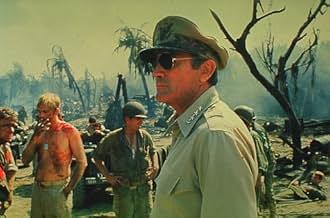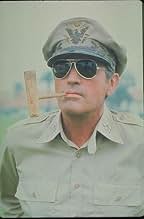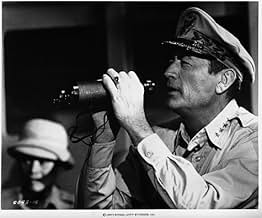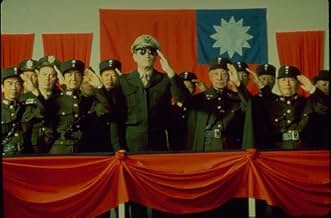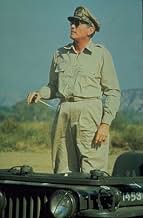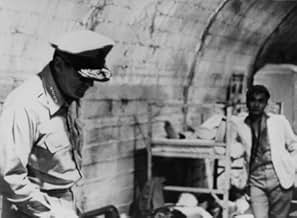AVALIAÇÃO DA IMDb
6,5/10
5,5 mil
SUA AVALIAÇÃO
Adicionar um enredo no seu idiomaBiopic of General Douglas MacArthur covering his war exploits during WW2 and the Korean War.Biopic of General Douglas MacArthur covering his war exploits during WW2 and the Korean War.Biopic of General Douglas MacArthur covering his war exploits during WW2 and the Korean War.
- Direção
- Roteiristas
- Artistas
- Prêmios
- 2 indicações no total
Russell Johnson
- Admiral King
- (as Russell D. Johnson)
- Direção
- Roteiristas
- Elenco e equipe completos
- Produção, bilheteria e muito mais no IMDbPro
Avaliações em destaque
Like the Movies made about Jesus Christ, no one is going to Agree about its complete Accuracy or Decisions concerning the Time Period covered. It's virtually an Impossible Task to present a Total Conception and with Budget and Running Time Restrictions adding to the Limitations.
Most WWII Historians, Armchair or otherwise, tend to give Gregory Peck a nod and are Thankful that His Liberal Leanings did not Cloud His Judgement or Portrayal of the Dynamic and Controversial General.
It is Well Known that MacArthur was Hell Bent on Crafting an Image of Himself as Larger than Life. The Movie has a few Scenes where His Aides Instruct the Newsreel Cameraman to Film the General from a Low Angle, "He loves that technique.". He used Props (corncob pipe) to give Himself a Unique Flair and His Filmed Entrances are Legendary.
MacArthur was not only a Brilliant General, He was a Brilliant Man. His Eloquent way with Words, making His Arguments and displayed Insights with a Poetic Zeal. All of the Aforementioned is seen in this Even Handed Account, originally Made-for TV than Edited for a Theatrical Release.
The Film is Sweeping in Concept, if not in Presentation. It's somewhat Low-Budget renders a Flat Production, but it makes up for it with Peck's Command of the Role and an Appropriately Wordy Script.
Above Average and a Powerful Portrayal of just over a Decade in the Complicated and ever Interesting Leader who was much Loved by the American People, the Philippines, and Japan (for His compassionate and intelligent restructuring of the island's ashes).
President Truman did not Worship the General, as many did and the Movie ends with MacArthur Relieved by the Commander and Chief. It seems even the Accomplished Military Leader was Unable to "Walk On Water", and was Symbolically Crucified by the President.
Most WWII Historians, Armchair or otherwise, tend to give Gregory Peck a nod and are Thankful that His Liberal Leanings did not Cloud His Judgement or Portrayal of the Dynamic and Controversial General.
It is Well Known that MacArthur was Hell Bent on Crafting an Image of Himself as Larger than Life. The Movie has a few Scenes where His Aides Instruct the Newsreel Cameraman to Film the General from a Low Angle, "He loves that technique.". He used Props (corncob pipe) to give Himself a Unique Flair and His Filmed Entrances are Legendary.
MacArthur was not only a Brilliant General, He was a Brilliant Man. His Eloquent way with Words, making His Arguments and displayed Insights with a Poetic Zeal. All of the Aforementioned is seen in this Even Handed Account, originally Made-for TV than Edited for a Theatrical Release.
The Film is Sweeping in Concept, if not in Presentation. It's somewhat Low-Budget renders a Flat Production, but it makes up for it with Peck's Command of the Role and an Appropriately Wordy Script.
Above Average and a Powerful Portrayal of just over a Decade in the Complicated and ever Interesting Leader who was much Loved by the American People, the Philippines, and Japan (for His compassionate and intelligent restructuring of the island's ashes).
President Truman did not Worship the General, as many did and the Movie ends with MacArthur Relieved by the Commander and Chief. It seems even the Accomplished Military Leader was Unable to "Walk On Water", and was Symbolically Crucified by the President.
No matter what you have to say about MacArthur, critical or otherwise, he shaped events in the Pacific theater of World War II to give him a part of history in the twentieth century. In this well done production with Gregory Peck in the leading role, he gives a candid performance of the flamboyant and publicity seeking authoritative General who turned earlier defeat into ultimate victory. His great speech on arrival from the Phillipines, by train at Spencer Street Station in Melbourne Australia in March 1942 incorporating those famous words - " I came through and I shall return" - was an inspiration to many Australians during their darkest hour.
From the time of his arrival in our country he quickly abandoned the idea of defending any mainland invasion by the Japanese and decided on an offensive in New Guinea as a counter attack. Peck is perfect in the role of the self minded MacArthur doggedly pursuing the Japanese back to their homeland while arguing with his own superiors, including U.S. President Franklin D. Roosevelt over his earlier promise to liberate the Phillipines, which was planned to be bypassed. After the Japanese surrender, MacArthur becomes virtual ruler of Japan modifying old customs and instituting sweeping land reforms. His authority remained absolute until the outbreak of the Korean War in 1950, when he clashed with new U.S. President Harry Truman over his successful campaign against the North Koreans and his intention to take on their Communist Chinese backers. Truman, wanting to avoid another world conflict, relieves MacArthur of his command and he is recalled home. Peck is magnificent with his captivating speech before a band of West Point recruits where he details his life and closes the movie with that famous caption " Old soldiers never die - they just fade away". This movie is a must for the younger generation of this world, to know that today's freedom was the result of the sacrifices made by their forbears.
To add a final footnote my mother worked at Archerfield aerodrome in Brisbane in 1942 with her sister where they were employed as aircraft riveter's being responsible for the repair of the fuselage of damaged U.S. Aircraft used during the defense of our country during World War 2. She told me well before her death in March 2004 how she took her limited time off from work to travel to central Brisbane just to watch General MacArthur walk down Queen Street from his home base at Lennons Hotel to the AMP building in Edward Street where he had his headquarters.
She said what a fine figure he cut, tall and handsome, and full of confidence in his goal of supreme victory. Her expectations in the faith of this great American General were ultimately justified. We are a free country today for the contribution of his great military expertise in the time of our greatest need.
From the time of his arrival in our country he quickly abandoned the idea of defending any mainland invasion by the Japanese and decided on an offensive in New Guinea as a counter attack. Peck is perfect in the role of the self minded MacArthur doggedly pursuing the Japanese back to their homeland while arguing with his own superiors, including U.S. President Franklin D. Roosevelt over his earlier promise to liberate the Phillipines, which was planned to be bypassed. After the Japanese surrender, MacArthur becomes virtual ruler of Japan modifying old customs and instituting sweeping land reforms. His authority remained absolute until the outbreak of the Korean War in 1950, when he clashed with new U.S. President Harry Truman over his successful campaign against the North Koreans and his intention to take on their Communist Chinese backers. Truman, wanting to avoid another world conflict, relieves MacArthur of his command and he is recalled home. Peck is magnificent with his captivating speech before a band of West Point recruits where he details his life and closes the movie with that famous caption " Old soldiers never die - they just fade away". This movie is a must for the younger generation of this world, to know that today's freedom was the result of the sacrifices made by their forbears.
To add a final footnote my mother worked at Archerfield aerodrome in Brisbane in 1942 with her sister where they were employed as aircraft riveter's being responsible for the repair of the fuselage of damaged U.S. Aircraft used during the defense of our country during World War 2. She told me well before her death in March 2004 how she took her limited time off from work to travel to central Brisbane just to watch General MacArthur walk down Queen Street from his home base at Lennons Hotel to the AMP building in Edward Street where he had his headquarters.
She said what a fine figure he cut, tall and handsome, and full of confidence in his goal of supreme victory. Her expectations in the faith of this great American General were ultimately justified. We are a free country today for the contribution of his great military expertise in the time of our greatest need.
Nice biographic film about controversial as well as flamboyant General masterfully played by Gregory Peck and who was Chief of Staff of the United States Army during the 1930s to 1940s and played a prominent role in the Pacific theater during World War II , having received the Medal of Honor for his service in the Philippines Campaign .
Agreeable biopic about the famed general concerning the latter years of his long military career , it starts with his assumption of command of the Philippine army and subsequent retreat ; going on through Inchon landing , China invasion on Korea crossing over parallel 39 and his sacking by President Harry Truman . This is a pretty good film with plenty of emotion , drama , biographic elements , historical events and Peck is spellbinding in the title role . The flick describes efficiently his particular character , complexity and the controversy that surrounded him . Very fine acting by the great Gregory Peck as military chief , he even bears remarkable resemblance to Douglas MacArthur , he had some of his hair shaved off since the real General was quite bald . Peck' outstanding acting arranges to bring alive this historical role , who strode a fine line between demigod and expert battlefield commander . Originally made for TV , it has a long runtime , at 144 minutes , being cut for cinema release . The picture gets magnificent interpretations from prestigious secondaries playing Generals and historical roles such as Kenneth Tobey (Adm. William 'Bull' Halsey) , Gen. George C. Marshall (Ward Costello) , Addison Powell (Fleet Adm. Chester W. Nimitz) , Dick O'Neill (Col. Courtney Whitney) , and Presidents as Dan O'Herlihy (Franklin D Roosevel) , Ed Flanders (Harry Truman) , and John Fujioka (Emperor Hirohito) . This is an engaging warlike drama made at the better for its historic resonance and will appeal to Gregory Peck fans.
Well produced by Frank McCarthy who also financed other warfare movies such as ¨Decision before dawn¨, ¨Single-Handed¨, ¨Fireball Forward¨ and ¨Patton¨ . This solid motion picture was professionally directed by Joseph Sargent , though it holds a certain television style . Sargent is an expert on biography and specialist on historical narrations , as he proved in 'Mandela and Clerk' , 'Abraham , 'McArthur' , 'When the lions roared' which reunited to Stalin , Churchill and again Roosevelt , 'Day one' with Oppenheimer and General General Groves and 'Warm Springs' about Franklin D Roosevelt ; these films don't pack the punch that he achieved in his best movie resulting to be 'Taking of Pelham one , two , three' .
And adding more biographical elements about this military hero : MacArthur was recalled to active duty in 1941 as commander of United States Army Forces in the Far East. A series of disasters followed, starting with the destruction of his air forces on 8 December 1941, and the invasion of the Philippines by the Japanese. MacArthur's forces were soon compelled to withdraw to Bataan, where they held out until May 1942. In March 1942, MacArthur, his family and his staff left nearby Corregidor Island in PT boats and escaped to Australia, where MacArthur became Supreme Commander, Southwest Pacific Area. And General Douglas MacArthur pronounces his famous line : "I will return" . For his defense of the Philippines, MacArthur was awarded the Medal of Honor. After more than two years of fighting in the Pacific, he fulfilled a promise to return to the Philippines. He officially accepted Japan's surrender on 2 September 1945, aboard the USS Missouri anchored in Tokyo Bay, and oversaw the occupation of Japan from 1945 to 1951. As the effective ruler of Japan, he oversaw sweeping economic, political and social changes. He led the United Nations Command in the Korean War until he was removed from command by President Harry S. Truman on 11 April 1951. He later became Chairman of the Board of Remington Rand.
Agreeable biopic about the famed general concerning the latter years of his long military career , it starts with his assumption of command of the Philippine army and subsequent retreat ; going on through Inchon landing , China invasion on Korea crossing over parallel 39 and his sacking by President Harry Truman . This is a pretty good film with plenty of emotion , drama , biographic elements , historical events and Peck is spellbinding in the title role . The flick describes efficiently his particular character , complexity and the controversy that surrounded him . Very fine acting by the great Gregory Peck as military chief , he even bears remarkable resemblance to Douglas MacArthur , he had some of his hair shaved off since the real General was quite bald . Peck' outstanding acting arranges to bring alive this historical role , who strode a fine line between demigod and expert battlefield commander . Originally made for TV , it has a long runtime , at 144 minutes , being cut for cinema release . The picture gets magnificent interpretations from prestigious secondaries playing Generals and historical roles such as Kenneth Tobey (Adm. William 'Bull' Halsey) , Gen. George C. Marshall (Ward Costello) , Addison Powell (Fleet Adm. Chester W. Nimitz) , Dick O'Neill (Col. Courtney Whitney) , and Presidents as Dan O'Herlihy (Franklin D Roosevel) , Ed Flanders (Harry Truman) , and John Fujioka (Emperor Hirohito) . This is an engaging warlike drama made at the better for its historic resonance and will appeal to Gregory Peck fans.
Well produced by Frank McCarthy who also financed other warfare movies such as ¨Decision before dawn¨, ¨Single-Handed¨, ¨Fireball Forward¨ and ¨Patton¨ . This solid motion picture was professionally directed by Joseph Sargent , though it holds a certain television style . Sargent is an expert on biography and specialist on historical narrations , as he proved in 'Mandela and Clerk' , 'Abraham , 'McArthur' , 'When the lions roared' which reunited to Stalin , Churchill and again Roosevelt , 'Day one' with Oppenheimer and General General Groves and 'Warm Springs' about Franklin D Roosevelt ; these films don't pack the punch that he achieved in his best movie resulting to be 'Taking of Pelham one , two , three' .
And adding more biographical elements about this military hero : MacArthur was recalled to active duty in 1941 as commander of United States Army Forces in the Far East. A series of disasters followed, starting with the destruction of his air forces on 8 December 1941, and the invasion of the Philippines by the Japanese. MacArthur's forces were soon compelled to withdraw to Bataan, where they held out until May 1942. In March 1942, MacArthur, his family and his staff left nearby Corregidor Island in PT boats and escaped to Australia, where MacArthur became Supreme Commander, Southwest Pacific Area. And General Douglas MacArthur pronounces his famous line : "I will return" . For his defense of the Philippines, MacArthur was awarded the Medal of Honor. After more than two years of fighting in the Pacific, he fulfilled a promise to return to the Philippines. He officially accepted Japan's surrender on 2 September 1945, aboard the USS Missouri anchored in Tokyo Bay, and oversaw the occupation of Japan from 1945 to 1951. As the effective ruler of Japan, he oversaw sweeping economic, political and social changes. He led the United Nations Command in the Korean War until he was removed from command by President Harry S. Truman on 11 April 1951. He later became Chairman of the Board of Remington Rand.
It is inevitable that MACARTHUR will be compared to PATTON, the other military biopic produced by the late Frank McCarthy. Such comparisons are unfortunate because their subjects are vastly different, albeit controversial figures, and each film takes a different approach in examining their impact on history.
George S. Patton commanded an Army formation in Europe while Douglas Macarthur commanded an entire theater of operation in the Pacific. By his own admission, Patton never had any political ambitions, while MacArthur definitely had such aspirations. Patton's political naivety made him ill-suited as the postwar occupation commander in Bavaria while MacArthur's political astuteness served him well during the occupation of Japan.
Yet both men were great, if iconoclastic military leaders. Patton's brilliant northern pivot during the Battle of the Bulge is matched by the MacArthur's daring amphibious landing at Inchon. And both men believed strongly in their destiny; Patton's belief was based on reincarnation while MacArthur was motivated by following in his illustrious father's footsteps.
Surprisingly, PATTON is the much more succinct, less ambitious film than MACARTHUR. It concentrates on its colorful, mercurial main character during a comparatively brief two-year period between the American defeat at Kasserine Pass in early 1943 to Patton's dismissal prior to his death in late 1945. Although we see Patton's conflict with Omar Bradley, Bernard Montgomery, and Bedell Smith, we never see his interaction with General Dwight Eisenhower, Prime Minister Winston Churchill, or General George Marshall, the U.S. Army's chief of staff.
MACARTHUR is a much more ambitious film, covering nearly a decade from the fall of Bataan in early 1942 to MacArthur's dismissal in 1951. Additionally, MACARTHUR shows a wider range of conflict between MacArthur and such individuals as Admiral Nimitz, General Marshall, ambassador William Averell Harriman, and Presidents Roosevelt and Harry S. Truman.
So, does MACARTHUR match PATTON as a groundbreaking biopic? No, it doesn't.
MACARTHUR lacks the insightful, acerbic screenplay that Francis Ford Coppola and Edmund North supplied PATTON. The direction by TV veteran Joseph Sargent is yeoman-like where the late Franklin J. Schaffner offers a more vigorous, hell-for-leather approach to PATTON. Both films are handsomely mounted productions that serve as a tribute to acumen of the producer McCarthy. Both movies benefit from film scores by the ever-reliable Jerry Goldsmith.
While PATTON has its main character departing in a Valhalla-like denouement, MACARTHUR is book-ended by the legendary speech that the old soldier delivered to the cadet corps at West Point in 1962 as a final valedictory.
At the heart of both films are the extraordinary performances of their lead actors. The late George C. Scott's portrayal of Patton is justly remembered, but Gregory Peck delivers a performance that is both subtle and unapologetic and helps to elevate this often-pedestrian production to a higher level. Peck's portrayal is reminiscent of his work in TWELVE O'CLOCK HIGH, but with the added weight of an additional thirty years of experience and craftsmanship that this great actor brings to bear to this role. Peck is ably supported by Dan O'Herlihy as FDR and the late Ed Flanders as Harry S. Truman.
Finally, I must note the presence of Dr. D. Clayton James, the author of the standard multi-volume biography of MacArthur, who served as this film's technical advisor.
George S. Patton commanded an Army formation in Europe while Douglas Macarthur commanded an entire theater of operation in the Pacific. By his own admission, Patton never had any political ambitions, while MacArthur definitely had such aspirations. Patton's political naivety made him ill-suited as the postwar occupation commander in Bavaria while MacArthur's political astuteness served him well during the occupation of Japan.
Yet both men were great, if iconoclastic military leaders. Patton's brilliant northern pivot during the Battle of the Bulge is matched by the MacArthur's daring amphibious landing at Inchon. And both men believed strongly in their destiny; Patton's belief was based on reincarnation while MacArthur was motivated by following in his illustrious father's footsteps.
Surprisingly, PATTON is the much more succinct, less ambitious film than MACARTHUR. It concentrates on its colorful, mercurial main character during a comparatively brief two-year period between the American defeat at Kasserine Pass in early 1943 to Patton's dismissal prior to his death in late 1945. Although we see Patton's conflict with Omar Bradley, Bernard Montgomery, and Bedell Smith, we never see his interaction with General Dwight Eisenhower, Prime Minister Winston Churchill, or General George Marshall, the U.S. Army's chief of staff.
MACARTHUR is a much more ambitious film, covering nearly a decade from the fall of Bataan in early 1942 to MacArthur's dismissal in 1951. Additionally, MACARTHUR shows a wider range of conflict between MacArthur and such individuals as Admiral Nimitz, General Marshall, ambassador William Averell Harriman, and Presidents Roosevelt and Harry S. Truman.
So, does MACARTHUR match PATTON as a groundbreaking biopic? No, it doesn't.
MACARTHUR lacks the insightful, acerbic screenplay that Francis Ford Coppola and Edmund North supplied PATTON. The direction by TV veteran Joseph Sargent is yeoman-like where the late Franklin J. Schaffner offers a more vigorous, hell-for-leather approach to PATTON. Both films are handsomely mounted productions that serve as a tribute to acumen of the producer McCarthy. Both movies benefit from film scores by the ever-reliable Jerry Goldsmith.
While PATTON has its main character departing in a Valhalla-like denouement, MACARTHUR is book-ended by the legendary speech that the old soldier delivered to the cadet corps at West Point in 1962 as a final valedictory.
At the heart of both films are the extraordinary performances of their lead actors. The late George C. Scott's portrayal of Patton is justly remembered, but Gregory Peck delivers a performance that is both subtle and unapologetic and helps to elevate this often-pedestrian production to a higher level. Peck's portrayal is reminiscent of his work in TWELVE O'CLOCK HIGH, but with the added weight of an additional thirty years of experience and craftsmanship that this great actor brings to bear to this role. Peck is ably supported by Dan O'Herlihy as FDR and the late Ed Flanders as Harry S. Truman.
Finally, I must note the presence of Dr. D. Clayton James, the author of the standard multi-volume biography of MacArthur, who served as this film's technical advisor.
It is noteworthy that mine is only the third review of this film, whereas `Patton- Lust for Glory', producer Frank McCarthy's earlier biography of a controversial American general from the Second World War, has to date attracted nearly a hundred comments. Like a previous reviewer, I am intrigued by why one film should have received so much more attention than the other.
One difference between the two films is that `Patton' is more focused, concentrating on a relatively short period at and immediately after the end of the Second World War, whereas `MacArthur' covers not only this war but also its subject's role in the Korean war, as well as his period as American governor of occupied Japan during the interlude.
The main difference, however, lies in the way the two leaders are played. Gregory Peck dominates this film even more than George C. Scott dominated `Patton'. Whereas Scott had another major star, Karl Malden, playing opposite him as General Bradley, none of the other actors in `MacArthur' are household names, at least for their film work. Scott, of course, portrayed Patton as aggressive and fiery-tempered, a man who at times was at war with the rest of the human race, not just with the enemy. I suspect that in real life General MacArthur was as volcanic an individual as Patton, but that is not how he appears in this film. Peck's MacArthur is of a more reflective, thoughtful bent, comparable to the liberal intellectuals he played in some of his other films. At times, he even seems to be a man of the political left. Much of his speech on the occasion of the Japanese surrender in 1945 could have been written by a paid-up member of CND, and his policies for reforming Japanese society during the American occupation have a semi-socialist air to them. In an attempt to show something of MacArthur's gift for inspiring leadership, Peck makes him a fine speaker, but his speeches always seem to owe more to the studied tricks of the practised rhetorician than to any fire in the heart. It is as if Atticus Finch from `To Kill a Mockingbird' had put on a general's uniform.
Whereas Scott attempted a `warts and all' portrait of Patton, the criticism has been made that `MacArthur' attempts to gloss over some of its subject's less attractive qualities. I think that this criticism is a fair one, particularly as far as the Korean War is concerned. The film gives the impression that MacArthur was a brilliant general who dared stand up to interfering, militarily ignorant politicians who did not know how to fight the war and was sacked for his pains when victory was within his grasp. Many historians, of course, feel that Truman was forced to sack MacArthur because the latter's conduct was becoming a risk to world peace, and had no choice but to accept a stalemate because Stalin would not have allowed his Chinese allies to be humiliated. Even during the Korean scenes, Peck's MacArthur comes across as more idealistic than his real-life original probably was; we see little of his rashness and naivety about political matters. (Truman 's remark `he knows as much about politics as a pig knows about Sunday' was said about Eisenhower, but it could equally well have been applied to MacArthur's approach to international diplomacy). Perhaps the film's attempt to paint out some of MacArthur's warts reflects the period in which it was made. The late seventies, after the twin traumas of Vietnam and Watergate, was a difficult time for America, and a public looking for reassurance might have welcomed a reassuringly heroic depiction of a military figure from the previous generation. Another criticism I would make of the film is that it falls between two stools. If it was intended to be a full biography of MacArthur, something should have been shown of his early life, which is not covered at all. (The first we see of the general is when he is leading the American resistance to the Japanese invasion of the Philippines). One theme that runs throughout the film is the influence of General MacArthur's father, himself a military hero. I would have liked to see what sort of man Arthur MacArthur was, and just why his son considered him to be such a hero and role model. Another interesting way of making the film would have been to concentrate on Korea and on MacArthur's clash with Truman, with equal prominence given to the two men and with actors of similar stature playing them. The way in which the film actually was made seemed to me to be less interesting than either of these alternative approaches.
It would be wrong, however, to give the impression that I disliked the film altogether. Although I may not have agreed with Peck's interpretation of the main role, there is no denying that he played it with his normal professionalism and seriousness. The film as a whole is a good example of a solid, workmanlike biopic, thoughtful and informative. It is a good film, but one that could have been a better one. 7/10.
On a pedantic note, the map which MacArthur is shown using during the Korean War shows the DMZ, the boundary between the two Korean states that did not come into existence until after the war. (The pre-war boundary was the 38th parallel). Also, I think that MacArthur was referring to the `tocsin' of war. War may be toxic, but it is difficult to listen with thirsty ear for a toxin.
One difference between the two films is that `Patton' is more focused, concentrating on a relatively short period at and immediately after the end of the Second World War, whereas `MacArthur' covers not only this war but also its subject's role in the Korean war, as well as his period as American governor of occupied Japan during the interlude.
The main difference, however, lies in the way the two leaders are played. Gregory Peck dominates this film even more than George C. Scott dominated `Patton'. Whereas Scott had another major star, Karl Malden, playing opposite him as General Bradley, none of the other actors in `MacArthur' are household names, at least for their film work. Scott, of course, portrayed Patton as aggressive and fiery-tempered, a man who at times was at war with the rest of the human race, not just with the enemy. I suspect that in real life General MacArthur was as volcanic an individual as Patton, but that is not how he appears in this film. Peck's MacArthur is of a more reflective, thoughtful bent, comparable to the liberal intellectuals he played in some of his other films. At times, he even seems to be a man of the political left. Much of his speech on the occasion of the Japanese surrender in 1945 could have been written by a paid-up member of CND, and his policies for reforming Japanese society during the American occupation have a semi-socialist air to them. In an attempt to show something of MacArthur's gift for inspiring leadership, Peck makes him a fine speaker, but his speeches always seem to owe more to the studied tricks of the practised rhetorician than to any fire in the heart. It is as if Atticus Finch from `To Kill a Mockingbird' had put on a general's uniform.
Whereas Scott attempted a `warts and all' portrait of Patton, the criticism has been made that `MacArthur' attempts to gloss over some of its subject's less attractive qualities. I think that this criticism is a fair one, particularly as far as the Korean War is concerned. The film gives the impression that MacArthur was a brilliant general who dared stand up to interfering, militarily ignorant politicians who did not know how to fight the war and was sacked for his pains when victory was within his grasp. Many historians, of course, feel that Truman was forced to sack MacArthur because the latter's conduct was becoming a risk to world peace, and had no choice but to accept a stalemate because Stalin would not have allowed his Chinese allies to be humiliated. Even during the Korean scenes, Peck's MacArthur comes across as more idealistic than his real-life original probably was; we see little of his rashness and naivety about political matters. (Truman 's remark `he knows as much about politics as a pig knows about Sunday' was said about Eisenhower, but it could equally well have been applied to MacArthur's approach to international diplomacy). Perhaps the film's attempt to paint out some of MacArthur's warts reflects the period in which it was made. The late seventies, after the twin traumas of Vietnam and Watergate, was a difficult time for America, and a public looking for reassurance might have welcomed a reassuringly heroic depiction of a military figure from the previous generation. Another criticism I would make of the film is that it falls between two stools. If it was intended to be a full biography of MacArthur, something should have been shown of his early life, which is not covered at all. (The first we see of the general is when he is leading the American resistance to the Japanese invasion of the Philippines). One theme that runs throughout the film is the influence of General MacArthur's father, himself a military hero. I would have liked to see what sort of man Arthur MacArthur was, and just why his son considered him to be such a hero and role model. Another interesting way of making the film would have been to concentrate on Korea and on MacArthur's clash with Truman, with equal prominence given to the two men and with actors of similar stature playing them. The way in which the film actually was made seemed to me to be less interesting than either of these alternative approaches.
It would be wrong, however, to give the impression that I disliked the film altogether. Although I may not have agreed with Peck's interpretation of the main role, there is no denying that he played it with his normal professionalism and seriousness. The film as a whole is a good example of a solid, workmanlike biopic, thoughtful and informative. It is a good film, but one that could have been a better one. 7/10.
On a pedantic note, the map which MacArthur is shown using during the Korean War shows the DMZ, the boundary between the two Korean states that did not come into existence until after the war. (The pre-war boundary was the 38th parallel). Also, I think that MacArthur was referring to the `tocsin' of war. War may be toxic, but it is difficult to listen with thirsty ear for a toxin.
Você sabia?
- CuriosidadesAlthough Gregory Peck had reservations about the film's script and production quality, he later called it one of his favorite roles, if not one of his favorite movies.
- Erros de gravaçãoShortly after MacArthur's escape from the Philippines in the spring of 1942, he complains that the President and the Chiefs of Staff are not sending him enough troops, supplies, and equipment to carry on his war against the Japanese. He says that priorities are instead being given to commanders in other theaters, including Gen Patton in North Africa. However, Patton's troops did not arrive in Africa until November 1942.
- Citações
President Sergio Osmena: You see, General, my people are going to laugh if I fell in deep water. I cannot swim!
General Douglas MacArthur: That's not so bad, Mr. President. Everyone's about to see that I can't walk on water.
- Versões alternativasThe UK DVD issue omits the sequence where MacArthur meets Emperor Hirohito, but instead, adds to the ending. The film now ends with MacArthur and his wife watch a TV transmission of the presidential inauguration of Eisenhower MacArthur's comment: "He will turn out fine. He was the best clerk that ever served under me"), followed by the end of MacArthur's farewell speech at West Point. The subsequent credits starts to roll slightly earlier than previously.
Principais escolhas
Faça login para avaliar e ver a lista de recomendações personalizadas
- How long is MacArthur?Fornecido pela Alexa
Detalhes
- Data de lançamento
- País de origem
- Idioma
- Também conhecido como
- MacArthur
- Locações de filme
- Navy Yard, Bremerton, Washington, EUA(scenes on USS Missouri)
- Empresa de produção
- Consulte mais créditos da empresa na IMDbPro
Bilheteria
- Orçamento
- US$ 9.000.000 (estimativa)
- Tempo de duração2 horas 10 minutos
- Mixagem de som
- Proporção
- 1.85 : 1
Contribua para esta página
Sugerir uma alteração ou adicionar conteúdo ausente

Principal brecha
By what name was MacArthur, O General Rebelde (1977) officially released in India in English?
Responda
